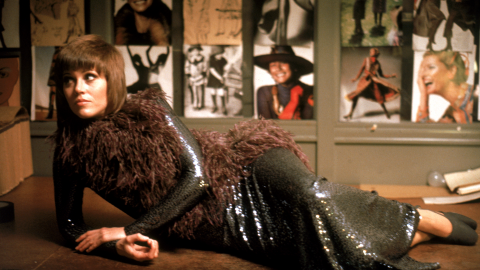
Rewriting Film History (with the Women in it)
Posted on Mon 13 Sept 2021
Cinema Rediscovered 2021 Film Critics Workshop participant Nadira Begum on the rich history of female ‘geniuses’ in cinema in front and behind the camera.
“The word ‘genius’ is gender neutral – we tend to forget that.” This important reminder was given by film critic and historian Pamela Hutchinson in conversation about Rewriting Film History (With the Women in It). The panel, led by archivists, Invisible Women, sought to imagine what film history might look like if we were to acknowledge the vast contribution women have made to films alongside men.
It is true that the desire for films made by underrepresented directors has increased in recent years, and the success of films such as Jordan Peele’s Get Out (2017) and even Bong Joon-ho’s Best Picture win for Parasite (2019) display a clear yearning for a change in the films that are being consumed. However, the lack of women acknowledged in the awards circuit and in discussions around cinema shows that there is still an obvious issue with the way that we talk about film history. Film critic Simran Hans said that film and film criticism “can often feel off-putting when our reference points are so limited.” This is clearly reflected in the countless ‘100 Greatest Films of All Time’ lists, the majority of the films on which are made by straight, white men (examples include Sight & Sound’s 100 Greatest Films of All Time and Empire’s 100 Greatest Movies). In a bid to counteract the guilt I felt for the years I spent consuming solely the films on these lists, I began digging deeper and soon discovered the many women who worked behind the scenes to make these films what they are.
Many of the women brought up in this conversation were women I’d discovered whilst researching the many male-directed films I’d enjoyed in the past. For example, Thelma Schoonmaker, Editor of many of Martin Scorsese’s films, rarely receives a mention in mainstream discourse around Scorsese’s legacy. When Mad Max: Fury Road (2015) was released, many rushed to praise director George Miller’s ability to capture the characters’ emotions with very little dialogue, but it was his Editor and wife Margaret Sixel whose editing made the lack of dialogue hardly noticeable. Using a technique wherein frames are removed from scenes, Sixel managed to convey the intense anxiety of Miller’s characters with ease, and despite winning the Academy Award for Best Editing, Sixel is still not lauded in the same way her husband is.
Not only is it the women behind the image who are doing some of the most memorable work, but also those in it. When the 1971 neo-noir crime thriller Klute was given as an example of a film where the leading actress’s performance was one of its most memorable aspects, I couldn’t help but let my mind wander to other films that perhaps wouldn’t have the status they have now without the women at their centre. What would Kill Bill (Vol. 1, 2003 and Vol. 2, 2004) be without Uma Thurman as The Bride? What would Alien (1979, and its sequels) be without Sigourney Weaver as Ripley?
This panel of speakers dared to challenge accepted discourse around films and imagine a world where we stopped viewing women as secondary, and started acknowledging the significant role they have and continue to play in cinema. There is a rich history of female ‘geniuses’ in cinema and it remains that women have made some of the most profound contributions to the industry – if only we were as willing to grant them the high status of ‘genius’ that we so quickly give to men.
Rewriting Film History (With The Women in It) took place online as part of Cinema Rediscovered 2021. The event was curated and hosted by archive activists Invisible Women with guest contributors including Helen O’Hara, author of Women Vs Hollywood: The Fall & Rise of Women in Film and film journalist (Empire), Pamela Hutchinson, author, film historian and critic (Guardian, Sight & Sound, BBC, Criterion, Empire) and writer, broadcaster and film critic for The Observer Simran Hans (Dazed, Sight & Sound, Guardian, New Statesman).
Nadira Begum
A freelance writer and contributor for Obscur Media. A recent English graduate from Manchester, Nadira's interests lie in film and literature, with a particular passion for texts that explore love and familial bonds. Her favourite author is James Baldwin and her favourite directors include Greta Gerwig and David Fincher. Twitter handle is @nadirawrites and Instagram is @iamnadirabegum.
